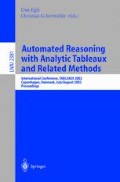Abstract
We present a (sound and complete) tableau calculus for Quantified Hybrid Logic (QHL). QHL is an extension of orthodox quantified modal logic: as well as the usual □ and ◊ modalities it contains names for (and variables over) states, operators @s for asserting that a formula holds at a named state, and a binder ↓ that binds a variable to the current state. The first-order component contains equality and rigid and non-rigid designators. As far as we are aware, ours is the first tableau system for QHL.
Completeness is established via a variant of the standard translation to first-order logic. More concretely, a valid QHL-sentence is translated into a valid first-order sentence in the correspondence language. As it is valid, there exists a first-order tableau proof for it. This tableau proof is then converted into a QHL tableau proof for the original sentence. In this way we recycle a well-known result (completeness of first-order logic) instead of a well-known proof.
The tableau calculus is highly flexible. We only present it for the constant domain semantics, but slight changes render it complete for varying, expanding or contracting domains. Moreover, completeness with respect to specific frame classes can be obtained simply by adding extra rules or axioms (this can be done for every first-order definable class of frames which is closed under and reflects generated subframes).
This research was supported by the Netherlands Organization for Scientific Research (NWO, grants# 612.000.106 and 612.062.001). This work was carried out as part of the INRIA funded partnership between LIT (Language and Inference Technology, ILLC, University of Amsterdam) and LED (Langue et Dialogue, LORIA, Nancy).
Access this chapter
Tax calculation will be finalised at checkout
Purchases are for personal use only
Preview
Unable to display preview. Download preview PDF.
References
C. Areces, P. Blackburn, and M. Marx. Hybrid logics: Characterization, interpolation and complexity. Journal of Symbolic Logic, 66(3):977–1010, 2001.
C. Areces, P. Blackburn, and M. Marx. Repairing the interpolation lemma in quantified modal logic. Report PP-2001-19, ILLC. To appear in Annals of Pure and Applied Logic.
K. Fine. Failures of the interpolation lemma in quantified modal logic. Journal of Symbolic Logic, 44(2):201–206, 1979.
M. Fitting. First Order Logic and Automated Theorem Proving (second edition). Springer Verlag, 1996.
M. Fitting. Types, Tableaus, and Gödel’s God. Unpublished Draft, 1999.
M. Fitting and R. Mendelsohn. First-Order Modal Logic. Kluwer, 1998.
D. Gabbay. Labelled Deductive Systems. Oxford University Press, 1996.
R. Goré. Tableau methods for modal and temporal logics. In M D’Agostino,et al editors, Handbook of Tableau Methods, pages 297–396. Kluwer Academic Publishers, 1999.
John McCarthy and Patrick J. Hayes. Some philosophical problems from the standpoint of artificial intelligence. In B. Meltzer and D. Michie, editors, Machine Intelligence 4, pages 463–502. Edinburgh University Press, 1969.
J. Seligman. Internalization: The case of hybrid logic. Journal of Logic and Computation, 11(5):671–689, 2001.
R. Smullyan. First Order Logic. Springer-Verlag, 1968.
J. van Benthem. Modal Logic and Classical Logic. Bibliopolis, Naples, 1983.
J. van Benthem. Correspondence theory. In D.M. Gabbay and F. Guenther, editors, Handbook of Philosophical Logic, volume 2, pages 167–248. Reidel, Dordrecht, 1984.
Author information
Authors and Affiliations
Editor information
Editors and Affiliations
Rights and permissions
Copyright information
© 2002 Springer-Verlag Berlin Heidelberg
About this paper
Cite this paper
Blackburn, P., Marx, M. (2002). Tableaux for Quantified Hybrid Logic. In: Egly, U., Fermüller, C.G. (eds) Automated Reasoning with Analytic Tableaux and Related Methods. TABLEAUX 2002. Lecture Notes in Computer Science(), vol 2381. Springer, Berlin, Heidelberg. https://doi.org/10.1007/3-540-45616-3_4
Download citation
DOI: https://doi.org/10.1007/3-540-45616-3_4
Published:
Publisher Name: Springer, Berlin, Heidelberg
Print ISBN: 978-3-540-43929-5
Online ISBN: 978-3-540-45616-2
eBook Packages: Springer Book Archive

